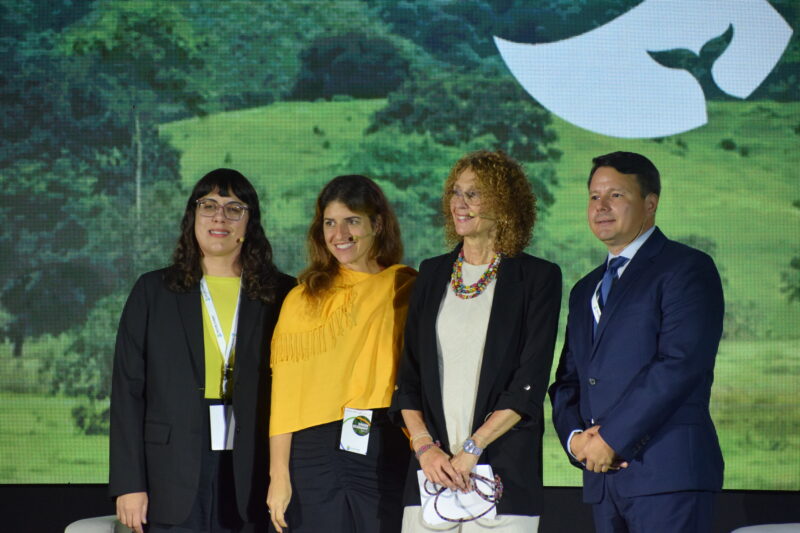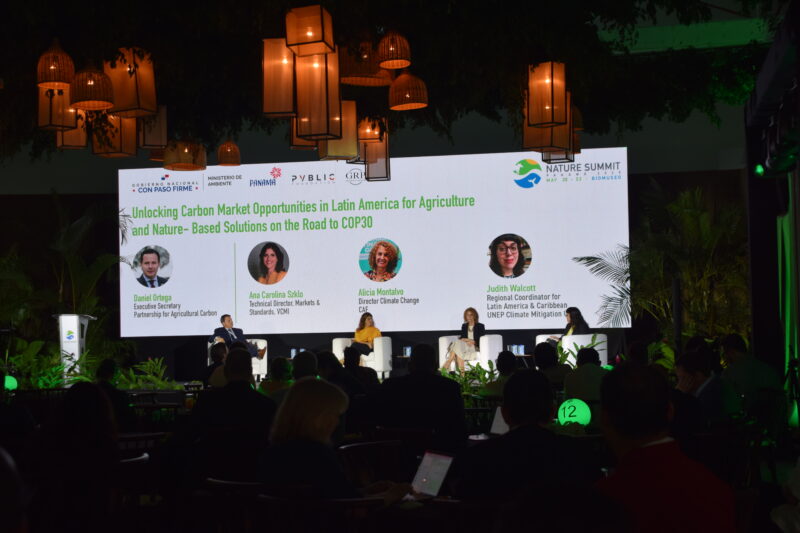From Panama to Belém: How Latin America and the Caribbean is Unlocking High-Integrity Carbon Markets for Agriculture and Nature
By Daniel Ortega Pacheco, Executive Secretariat Lead, Partnership for Agricultural Carbon (PAC) and Ana Carolina Avzaradel Szklo, Technical Director, Voluntary Carbon Markets Integrity Initiative (VCMI)
As Latin America and the Caribbean (LAC) prepares for COP30 on home soil, the region’s leadership on nature-based and agriculture-aligned climate solutions is gaining traction. From forest protection to farm resilience, the opportunity to unlock high-integrity carbon finance has never been more urgent—or more achievable. At the recent Nature Summit in Panama, hosted alongside the UNFCCC’s inaugural Global Climate Week, the Partnership for Agricultural Carbon (PAC) and the Voluntary Carbon Markets Integrity Initiative (VCMI) co-hosted a high-level conversation to reflect on what’s needed next to unlock this potential. Here’s what we heard—and where we’re headed.
Key Takeaways
The panel “Unlocking Carbon Market Opportunities in Latin America for Agriculture and Nature-Based Solutions on the Road to COP30” reinforced growing regional appetite for high-integrity carbon market implementation.
Strong alignment emerged around the need for enabling frameworks—not just project-level finance, but aggregated or jurisdictional approaches and methodologies—to scale climate solutions in rural sectors.
The pre-launch of PAC’s Latin America and the Caribbean (LAC) Ag Carbon Policy Tracker generated enthusiastic engagement—confirming demand for actionable, comparative policy intelligence.
The PAC–VCMI partnership demonstrates how collaborative, regionally grounded efforts can pool and enhance local expertise to bridge gaps in market access and policy capacity.
Calls from panelists highlighted the importance of capacity building to support the development of robust safeguards and equitable benefit-sharing—building on REDD+ lessons and tailored to agriculture.
COP30 was widely recognized as a defining moment to position Latin America and the Caribbean as a hub for nature-positive and people-centered carbon finance.
Fertile Ground: Creating the Policy Conditions for Scale
Kicking off the discussion, VCMI’s Ana Carolina Avzaradel Szklo emphasized the need for harmonized global policy and jurisdictional readiness: “We’ve seen exciting government momentum—from the UK’s endorsement of VCMI’s Claims Code to France’s Carbon Credit Charter. But without interoperable frameworks and regional policy alignment, it will be difficult to meet the scale of climate ambition or unlock consistent investor confidence.”
Through its Access Strategies Program, VCMI is working directly with countries and regions including Panama, Peru, Brazil and the Mexican state of Yucatán, helping them design frameworks that allow high-integrity carbon markets to complement—not replace—national climate ambition. The Partnership for Agricultural Carbon (PAC) is one such outcome of this initiative—supporting governments to build the institutional conditions needed to effectively leverage high-integrity carbon finance mechanisms in support of sustainable agricultural solutions.
From REDD+ to Agriculture: Embedding Equity and Inclusion
The UN Environment Programme’s (UNEP) Judith Walcott brought an equally important lens to the discussion: equity and safeguards in carbon projects. With over 15 years of experience supporting countries under the UN-REDD Program, she outlined the importance of robust environmental and social safeguards—including equitable benefit-sharing systems, nesting strategies, and governance alignment—also applicable for the agriculture sector.
Scaling carbon markets without safeguards, she noted, risks reinforcing exclusion. If Ministries of Agriculture are equipped with the right peer-to-peer learning models, they can be empowered as full partners—rather than afterthoughts—in climate finance design.
This is precisely what PAC seeks to facilitate through its AgRAP initiative: a Rapid Acceleration Program that trains farmers to ensure fair and equitable participation in carbon markets and high-integrity project incubation.
Investing in Readiness and Regional Collaboration
CAF Development Bank’s Alicia Montalvo linked these themes to the bank’s broader climate finance strategy. CAF has committed to scaling its green agenda, including nature-positive agriculture and ecosystem finance. Alicia reminded the audience that markets alone won’t deliver outcomes—that to be most effective, they should be anchored in investment strategies that integrate public-private coordination and national priorities.
CAF’s support for early-stage readiness, particularly in policy and institutional development, will be critical. This aligns closely with PAC’s upcoming online course for Agricultural Carbon Policy Makers, designed to help governments translate carbon opportunity into bankable, implementable frameworks.
Innovative Tools for a Thriving Policy Landscape
The session saw the successful pre-launch of the LAC Ag Carbon Policy Tracker, a PAC-led tool designed to monitor country-level progress on enabling carbon markets in agriculture. With over 25 variables—spanning regulatory, institutional, and MRV readiness—the tracker aims to provide actionable insight for governments, investors, and development partners.
The enthusiastic reception of the tracker teaser and QR-based access confirmed an appetite for tools and coordination mechanisms that help countries engage more strategically—and equitably—with climate finance opportunities.
Looking Ahead to COP30: Leading with Integrity in Latin America and the Caribbean
From the panel discussion to hallway conversations, it was clear: COP30 in Belém will be more than a climate summit—it will be a call to action. Latin America has the ecosystems, the political will, and the innovation to lead. But its leadership must be matched with collaboration, and its ambition with action.
As Latin America prepares to host the world in Belém, the region faces a unique opportunity: to lead not only with ambition, but to foster carbon markets grounded in integrity, innovation, and inclusion. The work ahead must bring ministries, market players, and marginalized communities into the same conversation. And it must deliver results—not just promises—for agriculture and nature.
At PAC and VCMI, we are committed to continuing this collaboration. As the road to Belém unfolds, we invite others—governments, financial institutions, and civil society—to join us in scaling high-integrity carbon markets that deliver for people, for nature, and for the planet.
To learn more about PAC and stay updated on the latest outputs, click here.
To learn more about VCMI’s Access Strategies Program, click here.


